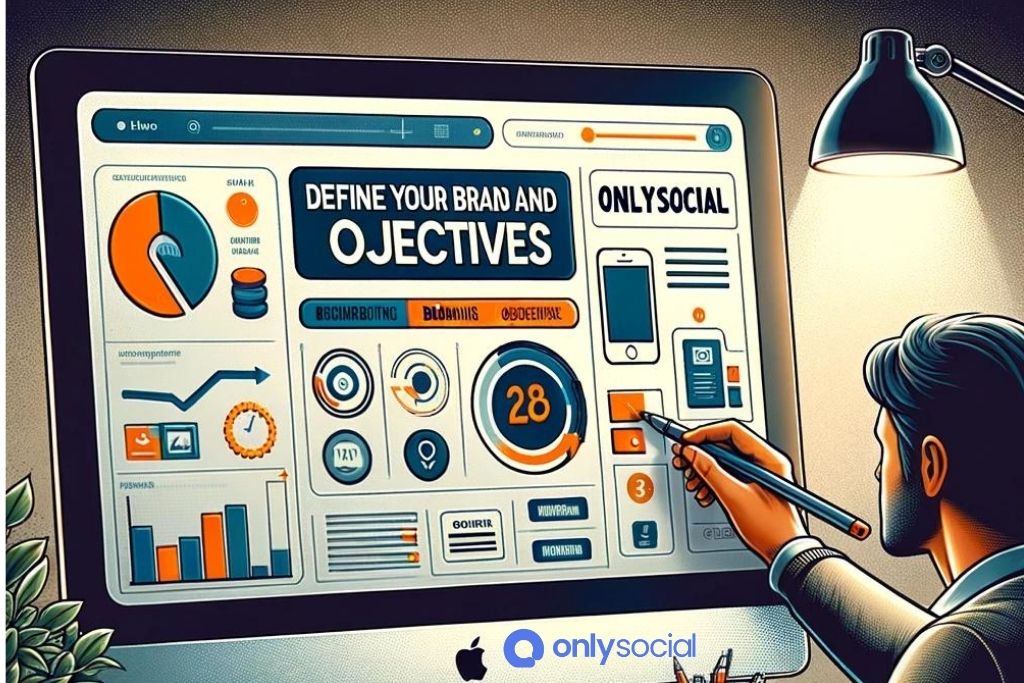In today’s rapidly evolving digital landscape, having a robust digital marketing strategy is no longer just an option—it’s a necessity for any brand looking to thrive and stand out. The digital world offers a plethora of opportunities for brands to connect with their audience, enhance visibility, and drive growth. However, navigating this complex terrain requires a well-thought-out plan that aligns with your brand’s goals, values, and target audience. A solid digital marketing strategy is the foundation upon which successful online marketing efforts are built, enabling brands to make informed decisions, allocate resources effectively, and measure success in real time.
The journey to developing a winning digital marketing strategy involves understanding the nuances of various digital channels, the preferences of your target audience, and the unique value proposition of your brand. It’s about crafting a tailored approach that leverages the right mix of tools, techniques, and technologies to achieve measurable outcomes. Whether you’re looking to increase brand awareness, boost sales, or engage with your customers more effectively, a strategic approach to digital marketing can help you achieve your objectives more efficiently and effectively.
This guide will walk you through the essential steps of crafting a digital marketing strategy that resonates with your brand and audience. From defining your brand and setting clear objectives to choosing the right channels, creating compelling content, and measuring your success, each step is designed to guide you through the process of building a digital marketing plan that not only meets but exceeds your expectations. Let’s embark on this journey together, and unlock the full potential of your brand in the digital arena.
Table of Contents
- 1 Define Your Brand and Objectives
- 2 Know Your Audience
- 3 Choose the Right Channels and Tactics
- 4 Create Compelling Content
- 4.0.1 Understanding the Role of Content in Digital Marketing Strategy
- 4.0.2 Planning Your Content Strategy
- 4.0.3 Types of Content to Include in Your Digital Marketing Strategy
- 4.0.4 Crafting Quality Content
- 4.0.5 Optimizing Content for Your Digital Marketing Strategy
- 4.0.6 Engaging and Promoting Your Content
- 5 Measure and Adjust
- 6 BONUS
- 7 Frequently Asked Questions
Define Your Brand and Objectives

Understanding Your Brand Identity
Before diving into the specifics of your digital marketing strategy, it’s crucial to have a firm grasp of your brand’s identity. This means clearly defining what your brand stands for, its core values, mission, and the unique value proposition it offers to customers. Your brand identity serves as the foundation for all your digital marketing efforts, ensuring consistency across all channels and resonating with your target audience. Ask yourself what makes your brand unique and how you want it to be perceived in the digital realm. This understanding will guide the tone, style, and direction of your digital marketing strategy.
Setting SMART Goals
To effectively measure the success of your digital marketing strategy, you need to set specific, measurable, achievable, relevant, and time-bound (SMART) goals. These goals should align with your overall business objectives, whether it’s increasing brand awareness, driving more website traffic, generating leads, or boosting online sales. For instance, a SMART goal for your digital marketing strategy could be “Increase website traffic by 20% within the next quarter through SEO and content marketing efforts.” By setting SMART goals, you create a clear roadmap for your digital marketing strategy and provide a way to measure progress and adjust tactics as needed.
Identifying Key Digital Marketing Objectives
After establishing your brand identity, the next step is to identify key objectives for your digital marketing strategy. Objectives should be closely tied to your business goals but tailored to the digital landscape. Consider objectives such as expanding your online presence, improving customer engagement through social media, or enhancing your email marketing conversion rates. Each objective should reflect a component of your digital marketing strategy that you can act upon, measure, and refine over time.
Aligning Objectives with Digital Marketing Channels
With your objectives in place, begin to consider which digital marketing channels are best suited to achieve them. For example, if your goal is to enhance brand awareness, social media platforms like Instagram or Facebook might be key channels to leverage. Alternatively, if your aim is to improve lead generation, focusing on search engine optimization (SEO) and pay-per-click (PPC) advertising could be more effective. The choice of channels will significantly influence the tactics you employ in your digital marketing strategy.
Know Your Audience
Understanding your audience is a cornerstone of any successful digital marketing strategy. The effectiveness of your efforts in digital marketing hinges on how well you understand and cater to the specific needs, preferences, and behaviors of your target audience. Here’s how to deepen your understanding of your audience to enhance your digital marketing strategy:
Identifying Your Target Audience
- Market Research: Conduct comprehensive market research to gather insights about your audience. Utilize online tools and platforms to analyze demographic information, such as age, gender, location, and interests, which are crucial for tailoring your digital marketing strategy.
- Buyer Personas: Develop detailed buyer personas that represent your ideal customers. Include information on their challenges, goals, and online behavior. These personas will guide you in creating content and campaigns that resonate with your audience.
Analyzing Audience Needs
- Feedback and Surveys: Regularly collect feedback through surveys, social media interactions, and customer reviews. This direct input from your audience provides valuable insights into their needs and how they perceive your brand.
- Engagement Analytics: Utilize analytics tools to monitor how your audience interacts with your digital content. Pay attention to metrics such as click-through rates, engagement rates, and time spent on your website. These indicators help refine your digital marketing strategy to better align with what captivates your audience.
Segmenting Your Audience
- Behavioral Segmentation: Divide your audience based on their behavior, such as purchase history, website visits, and content engagement. This allows for more personalized marketing efforts.
- Demographic Segmentation: Use demographic data to segment your audience for targeted campaigns. Tailored messaging based on age, location, or profession increases the relevance and effectiveness of your digital marketing strategy.
Tailoring Content to Audience Preferences
- Content Customization: Create content that addresses the specific interests and needs of your audience segments. Whether it’s blog posts, videos, or social media content, customizing the message to fit your audience increases engagement and conversion rates.
- Personalized Marketing Campaigns: Implement personalized email marketing campaigns or targeted ads to reach different segments of your audience. Personalization enhances the user experience and can significantly boost the performance of your digital marketing strategy.
Leveraging Social Media Insights
- Social Listening: Engage in social listening to understand the conversations around your brand and industry. This insight helps you to craft content that speaks directly to the current interests and concerns of your audience.
- Platform Analytics: Each social media platform offers analytics that provides a wealth of information about your followers. Analyze these insights to understand the best times to post, the types of content that perform best, and how to improve your interaction rates.
Choose the Right Channels and Tactics

In developing a digital marketing strategy, one of the most critical decisions you’ll make is selecting the appropriate channels and tactics to reach your target audience effectively. Each channel has its strengths and caters to different segments of your audience, making it essential to choose wisely to maximize your marketing efforts.
Understanding Digital Marketing Channels
- Search Engine Optimization (SEO): SEO is foundational to any digital marketing strategy. It involves optimizing your website and content to rank higher in search engine results, making it easier for potential customers to find you. Focus on keyword research, on-page optimization, and building quality backlinks.
- Content Marketing: Content is the heart of your digital marketing strategy. It helps in educating, entertaining, and engaging your audience while establishing your brand as a thought leader in your industry. Develop a content strategy that includes blogs, whitepapers, ebooks, and videos tailored to the interests and needs of your audience.
- Social Media Marketing: Social media platforms offer a direct way to engage with your audience. Choose platforms where your target audience is most active, whether it’s Instagram, Facebook, LinkedIn, or Twitter. Use these channels to share valuable content, interact with followers, and build a community around your brand.
- Email Marketing: Email marketing remains a highly effective channel for directly reaching your audience and driving conversions. Segment your email list to deliver personalized messages that cater to different user needs and stages in the customer journey.
- Pay-Per-Click (PPC) Advertising: PPC campaigns can drive immediate traffic to your website through ads on search engines and social media platforms. It’s a great way to gain visibility for competitive keywords and target specific demographics or interests.
- Affiliate Marketing: This performance-based marketing involves partnering with influencers or other brands to promote your products or services. It can expand your reach and bring in traffic from new sources.
Integrating Multiple Channels
The key to a successful digital marketing strategy is not just choosing the right channels but also integrating them to create a cohesive experience for your audience. For instance, use insights from your social media interactions to inform your content marketing strategy or retarget visitors from your SEO efforts with PPC ads. This integrated approach ensures that your brand message is consistent across all touchpoints and maximizes the impact of your digital marketing efforts.
Channel Optimization Based on Performance Metrics
Regularly review the performance of each channel using analytics tools to understand what’s working and what’s not. Look at metrics such as engagement rates, conversion rates, and ROI to evaluate the effectiveness of your chosen channels and tactics. Be prepared to adjust your strategy, experiment with new channels, or reallocate your budget based on these insights to continually refine your digital marketing strategy for optimal results.
Choosing the right channels and tactics is a dynamic part of your digital marketing strategy that requires ongoing evaluation and adaptation. By understanding the unique advantages of each channel and integrating them into a unified strategy, you can create more effective and efficient marketing campaigns that resonate with your audience and drive your brand toward its goals.
Create Compelling Content

Creating compelling content is the cornerstone of any successful digital marketing strategy. Content not only helps to communicate your brand’s message and values but also engages your audience and encourages them to take action. Here’s how to ensure your content stands out in the crowded digital landscape.
Understanding the Role of Content in Digital Marketing Strategy
- Content as a Communication Tool: Explain how content allows brands to communicate directly with their target audience, establish their brand voice, and convey their unique value proposition.
- SEO and Content: Discuss how quality content is crucial for search engine optimization (SEO), driving organic traffic to your website, and improving your rankings in search engine results pages (SERPs).
Planning Your Content Strategy
- Aligning Content with Your Digital Marketing Strategy: Emphasize the importance of creating content that supports your overall digital marketing goals, whether it’s increasing brand awareness, generating leads, or driving sales.
- Content Planning and Calendar: Guide readers on how to plan their content strategy, including setting objectives, identifying key themes and topics, and creating a content calendar to ensure consistent publication.
Types of Content to Include in Your Digital Marketing Strategy
- Blog Posts: Highlight how informative and engaging blog posts can attract and retain audience interest, position your brand as an industry leader, and improve SEO.
- Videos: Discuss the growing importance of video content in engaging audiences, increasing dwell time, and enhancing user experience on your website and social media channels.
- Infographics and Visual Content: Explain how visual content like infographics can simplify complex information, making it more digestible and shareable, thus increasing visibility and engagement.
- Podcasts and Webinars: Touch on the rising popularity of podcasts and webinars as effective ways to engage with a more in-depth audience, offering valuable insights and establishing a stronger connection with your audience.
Crafting Quality Content
- Audience-Centric Content: Stress the importance of creating content with the audience’s needs and interests in mind, making it relevant and valuable to them.
- Storytelling: Encourage the use of storytelling to make content more relatable and memorable, helping to build emotional connections with your audience.
- Authenticity and Transparency: Remind readers that authentic content that reflects the brand’s true values and mission resonates more deeply with audiences.
Optimizing Content for Your Digital Marketing Strategy
- Keyword Research: Provide tips on conducting keyword research to ensure your content is optimized for the right terms, helping to improve SEO and visibility.
- Content Optimization: Offer advice on optimizing content for search engines and users, including the use of meta tags, headings, and accessible language.
Engaging and Promoting Your Content
- Social Media Sharing: Discuss strategies for promoting your content on social media to increase reach and engagement.
- Email Marketing: Explain how content can be repurposed for email marketing campaigns to nurture leads and keep your audience engaged.
- Content Repurposing: Offer ideas on repurposing content across different formats and platforms to maximize its reach and lifespan.
Creating compelling content is not just about filling your digital channels with information; it’s about crafting messages that resonate with your audience, meet their needs, and inspire them to engage with your brand. By integrating content effectively into your digital marketing strategy, you can build a stronger, more meaningful connection with your audience and drive your brand toward achieving its goals.
Measure and Adjust
Crafting a digital marketing strategy is not a set-it-and-forget-it endeavor; it’s an ongoing process of measurement, analysis, and refinement. To ensure your digital marketing efforts lead to desired outcomes, it’s essential to track performance, learn from the data, and make informed adjustments. This step is crucial for optimizing your digital marketing strategy to achieve maximum impact and ROI.
Key Performance Indicators (KPIs)
- Identifying KPIs: Begin by determining the Key Performance Indicators relevant to your digital marketing strategy goals. These could include website traffic, conversion rate, social media engagement, email open rates, and more. Select KPIs that directly reflect your brand’s objectives and provide actionable insights.
- Digital Marketing Metrics: Dive into the specifics of each chosen KPI. For example, if your strategy focuses on content marketing, look at metrics like page views, bounce rate, and time spent on page. For social media marketing, analyze likes, shares, comments, and follower growth. These metrics will offer a granular view of your strategy’s performance.
Tools for Monitoring and Analysis
- Analytics Platforms: Utilize digital analytics tools like Google Analytics, social media analytics, and email marketing software to gather data on your strategy’s performance. These platforms offer comprehensive insights into user behaviour, campaign success, and areas for improvement.
- Dashboard Software: Consider using dashboard software to aggregate data from multiple sources into one accessible view. This allows for easier comparison of metrics across different channels and helps in making more informed decisions.
Making Data-Driven Adjustments
- Review and Interpret Data: Regularly review the data collected through your analytics tools. Look for trends, patterns, and anomalies that can inform your strategy adjustments. Identify what’s working well and what isn’t, focusing on areas with room for improvement.
- Test and Experiment: Digital marketing is dynamic, so it’s beneficial to adopt a test-and-learn approach. Experiment with different tactics, such as A/B testing email subject lines or trying new social media ad formats, to see what resonates best with your audience. Use the results of these tests to refine your approach.
- Adapt Based on Insights: Based on your analysis, make strategic adjustments to your digital marketing plan. This could mean reallocating your budget to more effective channels, tweaking your content strategy to better meet audience needs, or refining your SEO tactics based on keyword performance.
Staying Agile
- Responsive Strategy: The digital landscape is constantly evolving, with new platforms, technologies, and user behaviors emerging regularly. Keep your digital marketing strategy flexible and be prepared to pivot based on new insights and industry trends. This agility will help you maintain a competitive edge and achieve long-term success.
- Continuous Learning: Embrace a culture of continuous learning within your team. Encourage staying up-to-date with digital marketing best practices, attending workshops, and following thought leaders in the space. This commitment to learning will fuel innovative and effective adjustments to your strategy.
BONUS
Leverage OnlySocial’s Post Planning and Scheduling function to streamline your digital marketing strategy. With the ability to plan and schedule unlimited posts across all social networks, managing your brand’s online presence has never been easier. Embrace the convenience of handling unlimited social profiles and elevate your engagement without the hassle. Start with our commitment-free 7-day trial today
Frequently Asked Questions
What is a digital marketing strategy and why is it important for my business?
A digital marketing strategy is a plan that outlines how your business will achieve its marketing goals through online channels like search and social media. It’s crucial because it helps you target the right audience, engage with customers more effectively, and allocate resources to the most impactful activities.
How often should I review and update my digital marketing strategy?
Regular reviews are essential to ensure your strategy remains effective and responsive to market changes. It’s recommended to assess your digital marketing strategy quarterly and make adjustments as needed, with a thorough review and overhaul annually.
Can a small business with a limited budget create an effective digital marketing strategy?
Absolutely! Digital marketing offers a range of cost-effective tactics suitable for small businesses, such as content marketing, social media engagement, and SEO. The key is to focus on strategies that target your audience precisely and measure the results to refine your approach over time.
How do I choose the right digital marketing channels for my strategy?
Start by understanding where your target audience spends their time online and how they prefer to consume content. Experiment with different channels, track the performance and prioritize those that drive the best results for your brand objectives.
What are the key components of a successful digital marketing strategy?
A successful digital marketing strategy includes clear objectives, a deep understanding of your target audience, a comprehensive mix of marketing channels tailored to your audience’s preferences, compelling content, consistent measurement and analysis, and flexibility to adapt to change.
How can I measure the success of my digital marketing strategy?
Identify key performance indicators (KPIs) that align with your business goals, such as website traffic, lead generation, conversion rates, and social media engagement. Use analytics tools to track these metrics regularly and adjust your strategy based on the insights you gather.
Should my digital marketing strategy focus more on SEO or social media marketing?
Both SEO and social media marketing are important elements of a comprehensive digital marketing strategy. SEO helps you attract organic traffic through search engines, while social media allows you to engage directly with your audience. The balance between the two should be based on your specific business goals and target audience preferences.
How do I ensure my digital marketing strategy is customer-centric?
Incorporate customer feedback, market research, and persona development into your planning process to ensure your strategy addresses the needs, preferences, and pain points of your target audience. Tailor your content and campaigns to speak directly to your audience for more personalized and effective marketing.
Can digital marketing strategy help in improving customer loyalty and retention?
Yes, by leveraging personalized email marketing, engaging social media campaigns, and targeted content marketing, you can enhance customer satisfaction, encourage repeat business, and build a loyal community around your brand.
How important is content quality in a digital marketing strategy?
Content quality is critical; it establishes your brand’s credibility, engages and retains your audience, and contributes to SEO success. High-quality, valuable content tailored to your audience’s interests and needs can significantly enhance the effectiveness of your digital marketing strategy.




